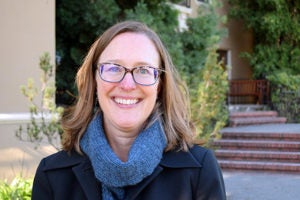Beyond the Rhodes

Applying to receive a Rhodes Scholarship – or any number of prestigious fellowships for international postgraduate study – can be both time consuming and complex. That’s where the Overseas Resource Center (ORC) at the Bechtel International Center can help.
The ORC works with undergraduates, graduate students and recent alumni interested in pursuing any of the many scholarships for study and research abroad. Diane Murk, assistant dean and manager of the ORC, answers questions about how the center can help members of the Stanford community assess which scholarships are best tailored to their interests, develop a competitive application and prepare for interviews.
What does the Overseas Resource Center do to support students who aspire to win a postgraduate scholarship for study and research abroad?
The ORC advises students on a number of overseas scholarships, administers the campus process for over a dozen awards and promotes more than 50 of these international opportunities. We offer guidance to students through one-on-one advising sessions, information sessions, application workshops, interview preparation and other resources.
Everyone thinks immediately about the Rhodes Scholarships, but what are some of the other scholarships Stanford students and alumni successfully compete for?
Besides the Rhodes, many Stanford students compete for the Marshall Scholarship, which is one to three years of graduate study at a British institution. The Marshall has a similar campus process as the Rhodes.
As another example, the Fulbright grants offer one academic year of research or study or English teaching assistantships in over 150 different countries. Stanford has been one of the Fulbright’s top-producing institutions over the past few years. We are holding a Fulbright information session at Bechtel on Tuesday, Feb. 11 at 4 p.m.
The Churchill, Gates-Cambridge, Mitchell, Schwarzman, Yenching, Boren Awards, Luce, DAAD, Critical Language Scholarship and Gilman are also fantastic scholarship opportunities to study and/or do research abroad. Some of these fellowships even offer internships and language training as part of their programs. Our ORC website lists even more, and we are holding an information session that explains worldwide awards on Thursday, Feb. 20, at Bechtel at 4 p.m.
Stanford’s Knight-Hennessy Scholars program, the largest fully endowed scholars program in the world, is also a great opportunity for students – although not one that our office directly assists with since it is domestic rather than international.
How soon does a prospective applicant have to start thinking about and planning to apply for an international scholarship?
It’s never too early to start thinking about these overseas awards. For the majority of the postgraduate scholarships, students need to have their bachelor’s degree by the start date of the program. Therefore, we tend to focus on juniors and seniors for those. However, because of the array of international fellowships we promote, there are many opportunities for undergraduates, graduate students and even recent alumni.
How time consuming is the process and what’s generally involved?
Students need to think about why they would like to go abroad and then find out when the deadlines are and work backwards. That often means thinking about these scholarships a year or more in advance, given that most of the deadlines are in the late summer or early fall.
Many of these awards require several months of preparation in order to put together a strong application. Application components can include a personal statement, statement of purpose or proposed study/research, CV, transcripts, several letters of recommendation and also a letter of affiliation depending on the award. Some scholarships require an institutional endorsement, and students have to follow the campus application process that usually involves an interview. Not all scholarships are the same, and because of that, we can help students navigate the process for the awards to which they wish to apply.
What is the advantage of earning something like a Rhodes, Marshall or Fulbright?
Recipients of highly competitive scholarships like the Rhodes and Marshall will have the opportunity to pursue one to three years of postgraduate study or research in the United Kingdom at world-class institutions.
Fulbright grantees are also affiliated with excellent universities and organizations around the globe. They can pursue independently designed research, graduate study or teach English. The benefits include funding for tuition, room and board, round trip airfare and more.
Other advantages of these scholarships include connecting to a network of current and future leaders from around the world, making contributions to advance knowledge in a variety of fields, working on cutting-edge research and gaining a deeper understanding of other cultures by an extended period of time abroad.
What advice do you have for a student who is thinking about applying for a scholarship for study and research abroad?
Do well academically, get to know faculty, get involved in extracurricular activities that connect with your purpose and passion and seek leadership roles and experiences. Think about what kind of a difference you would like to make in the world and how you foresee yourself as a change agent in the future. Read the scholarship websites. Keep your eyes open for upcoming information sessions on the scholarships that might be of interest to you.
